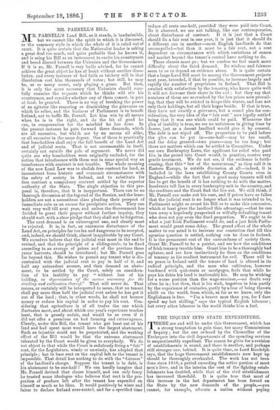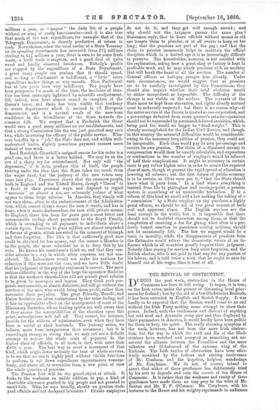THE INQUIRY INTO STATE EXPENDITURE. millions a year, or "
inspect " the daily life of a people without an army of costly functionaries—and it is also true that much of the new expenditure, for example that of the Telegraph Department, is directly productive of return in cash. Nevertheless, when the total outlay of a State Treasury on its spending departments has increased from 27-1- millions sterling to 6l millions a year, there is sure to be some fresh waste, a little fresh corruption, and a good deal of quite novel and hardly observed lavishness. Nobody's profits are stopped by the expenditure of a State Department, a great many people are anxious that it should spend, and so long as Parliament is indifferent, a " little " extra expenditure makes things so very smooth. Now, Parliament has of late years been very indifferent. The people have been prosperous for much of the time, the incidence of taxa- tion has been amazingly lightened by scientific readjustment, till, indeed, men have almost ceased to complain of the Queen's taxes, and there has been visible that tendency to create departments which is noticed in all European democracies, and is a natural result of the new-born confidence in the friendliness of the State towards the common folk. We suspect that a Frederick the Great would save a good many millions on our establishments, and that a strong Commission like the one just gazetted may save two, while increasing the efficacy of the public service. Who- ever benefits by a "job," the State does not, and within well- understood limits, slightly penurious payment ensures more instead of less work.
Lord Randolph Churchill's assigned reason for his order is a good one, and there is a better behind. We may be on the eve of a sharp cry for retrenchment. Not only will "the depression," if it la,ts, produce this of itself, the people fretting under the idea that the State takes too much from the wages fund, but the jealousy of the new voters may come into play. Experience shows that the common people, both in England and the United States, though "liberal" to a fault in their personal ways, and disposed to regard " nearness " as almost a sin, are extremely jealous of what appear to them large salaries. In America, they simply will not vote them, often to the embarrassment of the Administra- tion, which cannot always secure the men it wants, and has to hunt, when it wants Ambassadors, for men with private means. In England, there has been for years past a most bitter and unreasonable feeling about payments to the Royal Family, which is extending to all payments to individuals above a certain figure. Pensions to great soldiers are almost suspended in favour of grants, which are voted in the moment of triumph and then forgotten. The idea is that sufficiently good men could be obtained for less money, and the nearer a Member is to the people, the more reluctant he is to deny this by his vote. Be knows his constituents think so, and that they con- sider salaries in a way in which other expenses are not con- sidered. Mr. Labouchere would not make his motions for reduction if this were not the case, and we have little doubt that his judgment of the popular sentiment is correct. The most serious difficulty in the way of the large Co-operative Societies is that the workmen shareholders will not permit great salaries to be given to managers and buyers. They think such pro- posals unreasonable, or almost dishonest, and will go without the services of the men who would bring them profit, rather than surrender their prejudice. The great Friendly, Benefit, and Union Societies are often embarrassed by the same feeling, and it has an appreciable effect on the management of most of the Missionary Societies, whose leading spirits are well aware that if they arouse the susceptibilities of the churches upon this point, subscriptions will fall off. They cannot, for instance, provide for the widows of missionaries, even when they have been as useful as their husbands. The jealousy arises, we believe, more from inexperience than meanness ; but it is exceedingly strong, so strong that we may yet see a definite attempt to reduce the whole scale of payment to the higher class of officials, to all men, in fact, with more than £800 a year. The best way to avert a movement of that kind, which might lower seriously the tone of whole services, is to see that no one is highly paid without visible functions to perform, to cut down superfluous appointments remorse- lessly, and above all, to reconsider from a new point of view the whole question of pensions. The Pension List will be the grand object of attack. It looks to the workman an unfair addition to pay, a kind of charitable allowance granted to big people and not granted to small folk. Why, he says broadly, should we pension dock- yard officials and not dockyard labourers Private employers do not do it, and they get well enough served ; and why should not the taxpayer pursue the same plan ? Statesmen reply, that to leave officials without means in old age tempts them to plunder, or at all events to hang on too long ; that the pensions are part of the pay ; and that the claim to pension immensely helps to maintain the official discipline which in a lenient age it is so increasingly difficult to preserve. The householder, however, is not satisfied with the explanation, asking how a great shop or factory is kept in profitable work, and he may attack pensions with an acerbity that will break the heart of all the services. The number of General officers on half-pay enrages him already. Under such circumstances, we would suggest that as pensions are to be carefully investigated by this Commission, they should also inquire whether their total abolition would be either inexpedient or impossible. The difficulty of the change is not visible on the surface. The servants of the State must be kept from starvation, and rights already accrued must be seduously respected ; but there is no reason why—if the entire service of the Crown is treated as one corporation, and a per-centage deducted from every quarter's salaries—pensions should not be superseded by purchased deferred annuities, which, being paid for, would no longer be "dead-weight." This is already accomplished for the Indian Civil Service, and though in this country the actuarial difficulties would be considerable, owing to the necessary inequalities of pension, they could not be insuperable. Each class would pay its own per-centage and receive its own pension. The claim of a dismissed servant to compensation would then be exactly calculable, and expansions or contractions in the number of employes would be relieved of half their complications. It might be necessary in certain cases to pay rather higher rates in order to secure the required class of men, though at present the rapid spread of education is lowering all salaries ; but the first datum of public economy is to be certain, as Clive once put it, "that the State should know what it parts from." In a land where everything is insured, from life to plate-glass and carriage-paint, a pension system is something of an unscientific barbarism. If to a reform of this kind we could add a law making the taking of a " commission " by a State employe on any purchase a highly penal offence, we should be rid of two great sources of both real and apparent abuse. The English services are the least corrupt in the world, but it is impossible that there should not be doubtful characters among them, or that the temptation of receiving a fee for giving what often is a per- fectly honest sanction to purchases costing inKlions, should not be occasionally felt. The law we suggest would be a tonic to morality, while the disappearance of pensions from the Estimates would relieve the democratic voters of an in- fluence which in all countries greatly impairs their judgment. Nobody likes paying for services long since forgotten, and the British elector, who is not paid in that way for any portion of his labour, and is told twice a week that he ought to save for himself out of his wages, likes it least of all.



































 Previous page
Previous page